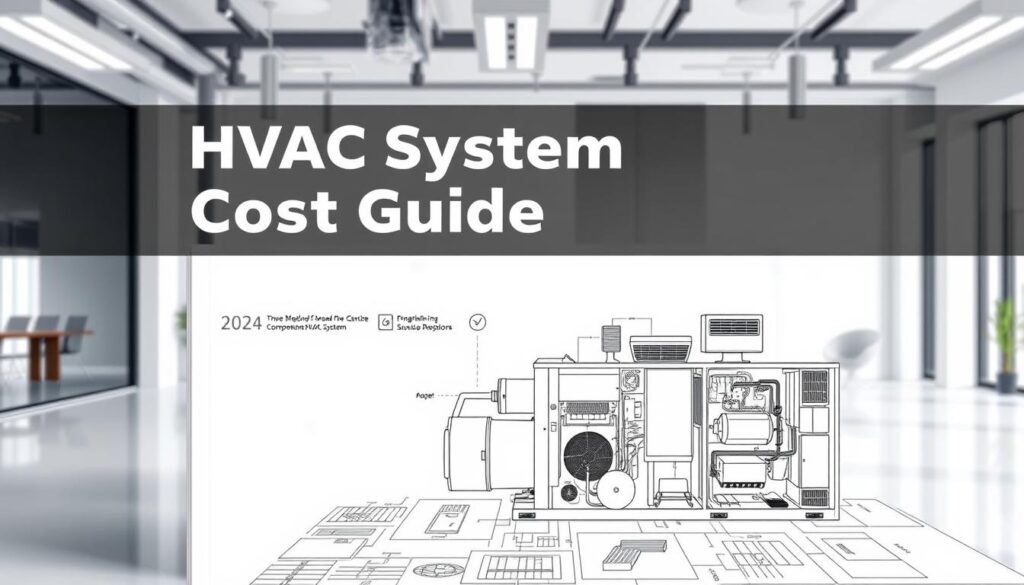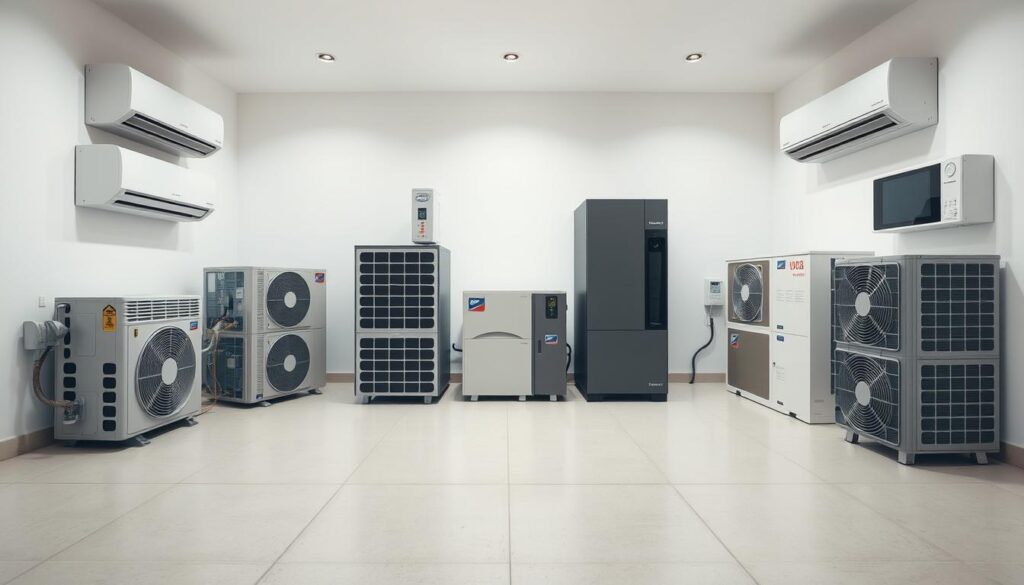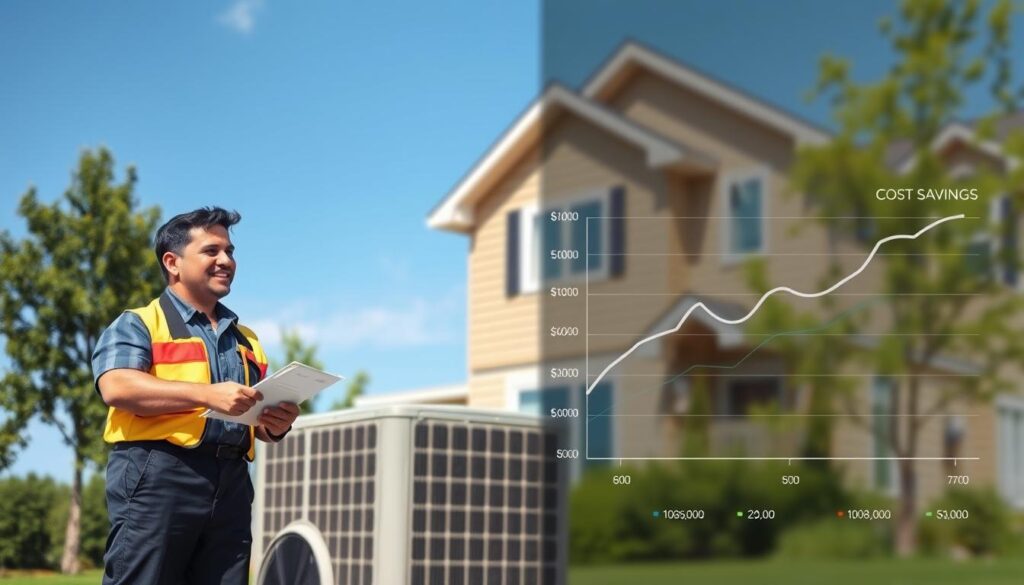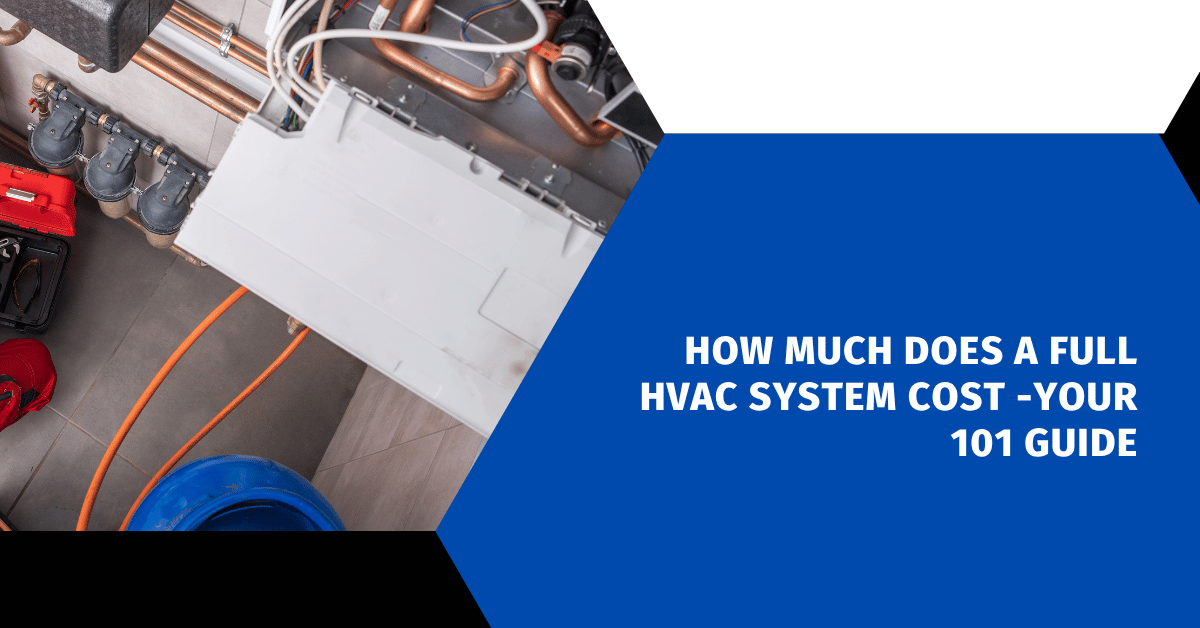Affiliate Disclosure
HVAC Guide Guys is a participant in the Amazon Services LLC Associates Program, an affiliate advertising program designed to provide a means for sites to earn advertising fees by advertising and linking to Amazon.
How Much Does a Full HVAC System Cost? Are you curious about the cost of a full HVAC system in 2024? Homeowners often get surprised by the cost of a complete HVAC installation.

It’s important to know the total cost of an HVAC system if you’re watching your budget. Replacing or installing a new HVAC system can cost between $5,000 and $12,500. The average price is around $7,500.
Understanding the cost of a full HVAC system helps you plan better. It helps you avoid unexpected costs and make smart choices for your home’s comfort and energy use. This guide will explain the main factors that affect HVAC system prices in 2024.
Key Takeaways
- Average HVAC system replacement costs range from $5,000 to $12,500
- Prices depend on home size, system type, and local market conditions
- Energy efficiency can significantly impact long-term costs
- Professional installation is critical for optimal system performance
- Consider both upfront and operational expenses when budgeting
Table of Contents
Understanding HVAC System Costs in 2024
Exploring the cost of HVAC systems can be confusing. In 2024, homeowners deal with many factors that affect the cost of replacing their HVAC. Knowing these details helps you choose the best option for your home’s comfort and your budget.
The cost of an HVAC system includes several parts that affect your total investment. Your specific costs will depend on a few important things:
- System type and complexity
- Home square footage
- Local labor rates
- Energy efficiency ratings
Average Installation Expenses
Installing a residential HVAC system usually costs between $5,000 and $12,000. This range shows how different homes and systems affect the price. Smaller homes might cost less, while bigger ones need more work.
Labor and Material Considerations
Professional HVAC technicians charge between $50 and $100 per hour. The cost of materials changes based on the quality and features of the equipment. High-efficiency systems cost more at first but save money in the long run.
Regional Price Dynamics
Your location greatly affects the cost of HVAC installation. Cities with higher costs have pricier labor. Coastal and extreme climate areas need stronger systems, which also raises the cost.
Explore Our HVAC Shop
Looking for top-rated HVAC tools, parts, and accessories? Visit our shop and find the perfect solution for your needs.
Visit the ShopHow Much Does a Full HVAC System Cost
Knowing the cost of a full HVAC system helps you plan your home comfort investment. In 2024, homeowners can expect to spend between $5,000 and $12,500 for a complete HVAC system replacement. The average price is around $7,500.
The cost of hvac unit prices depends on several key factors. These include:
- Home square footage
- System efficiency ratings
- Local climate conditions
- Equipment brand quality
- Installation complexity
Your specific HVAC system cost will vary based on these unique considerations. Smaller homes might see lower prices. Larger residences or those requiring more complex installations could push costs toward the higher end of the spectrum.
“Investing in a quality HVAC system is not just an expense, but a long-term home comfort strategy.”
When budgeting for your HVAC replacement, consider both upfront costs and energy savings. Higher-efficiency systems might have a higher initial price. But they can significantly reduce your monthly utility expenses over time.
Professional installation is key for optimal performance. Expect labor costs to represent about 30-40% of your total HVAC system investment. Choosing a reputable contractor ensures proper sizing and efficient installation of your new system.
Factors Affecting HVAC Installation Pricing
Knowing what affects hvac installation cost helps you choose the right heating and cooling system. Each project has its own challenges that change the price and how hard it is to install.
Many important factors decide how much your commercial or residential HVAC system will cost:
Home Size and System Requirements
The size of your home affects the HVAC system you need. Bigger homes need stronger systems, which means higher costs. A typical home system is between 1.5 and 5 tons, with each ton cooling 12,000 BTUs.
- Smaller homes (1,000-1,500 sq ft): 2-ton system
- Medium homes (1,500-2,500 sq ft): 3-ton system
- Larger homes (2,500-3,500 sq ft): 4-5 ton system
Energy Efficiency Ratings
Systems with higher efficiency ratings cost more upfront but save money in the long run. SEER ratings show how well a system cools. Better SEER ratings mean more cost but less energy use.
Installation Complexity
The difficulty of your HVAC installation greatly affects the price. Things like ductwork, home layout, and access can raise labor costs. Older homes might need big changes, which can greatly increase the cost.
Getting a professional to assess your needs is key to understanding what you’ll need and any challenges.
Explore Our HVAC Shop
Looking for top-rated HVAC tools, parts, and accessories? Visit our shop and find the perfect solution for your needs.
Visit the ShopTypes of HVAC Systems and Their Costs
Choosing the right HVAC system is key to your home’s comfort and energy use. Knowing the different types helps you understand hvac system pricing and energy efficient hvac cost.

The market has many HVAC system options. Each has its own features and prices:
- Central Air Conditioners: Great for big homes
- Heat Pumps: Good for both heating and cooling
- Ductless Mini-Split Systems: Perfect for precise temperature control
- Geothermal Heat Pumps: Very efficient but pricey
Your home’s needs will guide you to the best HVAC system. Consider your home’s size, climate, and budget.
| HVAC System Type | Average Cost Range | Energy Efficiency |
|---|---|---|
| Central Air Conditioner | $3,000 – $7,000 | Medium |
| Heat Pump | $4,000 – $8,000 | High |
| Ductless Mini-Split | $2,000 – $5,000 | Very High |
| Geothermal Heat Pump | $10,000 – $25,000 | Highest |
When looking at hvac system pricing, think about the long-term savings. More expensive systems often save money on energy costs over time.
Energy Efficiency and Long-term Savings
Getting an energy efficient HVAC system can cut down your long-term costs. It’s key to know how efficiency affects your hvac costs for smart home choices.
Energy efficiency in HVAC systems isn’t just about the environment—it’s about saving money. The right system can greatly lower your yearly costs while keeping your home comfy.
SEER Ratings Explained
SEER (Seasonal Energy Efficiency Ratio) ratings show how well your system cools. Here’s what you need to know:
- Minimum SEER rating of 14 required in Northern states
- Southeast and Southern regions require at least 15 SEER
- Systems with SEER 10 or lower should be replaced
Annual Operating Costs
Your HVAC system’s efficiency affects your yearly energy bills. A higher SEER rating means lower electricity bills. For example, upgrading from a 10 SEER to a 16 SEER system can reduce cooling costs by up to 60%.
Return on Investment Calculations
When looking at energy efficient hvac costs, calculate your savings:
- Compare initial system price
- Estimate annual energy savings
- Calculate payback period
Higher efficiency systems might cost more at first but save thousands over time. Think about your home’s needs and local energy prices to choose wisely.
Explore Our HVAC Shop
Looking for top-rated HVAC tools, parts, and accessories? Visit our shop and find the perfect solution for your needs.
Visit the ShopAdditional HVAC Components and Costs
Adding extra parts to your HVAC system can make your home more comfortable and the air cleaner. These upgrades might cost more at first. But, they offer benefits that last a long time and are worth the investment.
When looking at ductwork costs, think about extra parts that can make your HVAC system better. These parts can improve how well your home heats and cools:
- Smart Thermostats: Intelligent temperature control
- Whole House Air Purifiers: Advanced air quality management
- Humidity Control Systems: Dehumidifiers and humidifiers
- Variable-Speed Motors: Enhanced energy efficiency
Here’s a look at the costs and benefits of these extra HVAC parts:
| Component | Average Cost | Primary Benefit |
|---|---|---|
| Smart Thermostat | $200 – $500 | Energy savings and remote control |
| Whole House Air Purifier | $600 – $1,500 | Improved indoor air quality |
| Humidifier | $300 – $800 | Balanced indoor moisture levels |
| Dehumidifier | $250 – $700 | Reduced humidity and mold prevention |
The cost of ductwork for your HVAC depends on your home’s size and how hard it is to install. Getting a professional to check your home is key to finding the best upgrades for you.
Even though these extra parts cost more upfront, they offer big benefits in the long run. They can make your home more comfortable, the air cleaner, and save energy.
When to Replace Your HVAC System
Deciding when to replace your HVAC system can be tough. The cost of a new system is high, but upgrading at the right time can save money. It also makes your home more comfortable.
Your HVAC system won’t last forever. Central air conditioners, furnaces, and heat pumps usually last 15-20 years with good care. But, there are signs that it’s time for a new system.
Age-Based Recommendations
- Systems older than 15 years typically become less efficient
- Repair frequency increases dramatically after 10 years
- Energy consumption rises with system age
Efficiency Considerations
An old HVAC system can cost you a lot in energy bills. Modern systems offer significant improvements in energy efficiency. This can make up for the cost of a new system over time.
Repair vs. Replace Decision Making
Use the “5,000 rule” to decide: Multiply the system’s age by repair cost. If it’s over $5,000, it’s usually cheaper to replace than to keep fixing.
- Three or more repairs in three years signal replacement time
- Rising energy bills indicate declining system performance
- Inconsistent heating or cooling suggests system degradation
Getting a new HVAC system can make your home more comfortable. It can also lower your energy bills and give you peace of mind.
Explore Our HVAC Shop
Looking for top-rated HVAC tools, parts, and accessories? Visit our shop and find the perfect solution for your needs.
Visit the ShopSeasonal Timing and Cost Savings

Choosing the right time for your HVAC installation can save you money. Homeowners who plan well can find better deals on hvac unit prices.
Installing your HVAC during off-peak seasons is usually the smartest move. Contractors offer lower prices when they’re not as busy. This can help you save on your investment in home comfort.
- Spring and Fall: Optimal seasons for HVAC replacements
- Summer: Peak pricing for air conditioning units
- Winter: Higher costs for furnace installations
Planning ahead can cut down your costs. Here are some tips to save money on your HVAC replacement:
- Schedule installations during shoulder seasons
- Request multiple quotes from contractors
- Look for seasonal promotions and discounts
| Season | HVAC Unit Pricing | Availability |
|---|---|---|
| Spring | Lower Prices | High Contractor Availability |
| Summer | Peak Prices | Limited Availability |
| Fall | Moderate Prices | Good Contractor Options |
| Winter | Higher Prices | Limited Availability |
Pro tip: Budget-conscious homeowners should plan their HVAC replacements during less busy seasons to maximize savings and ensure quality installation.
Conclusion
Understanding the cost of a full HVAC system is key for homeowners. It’s not just about the price of the equipment. It’s about long-term performance, energy efficiency, and comfort.
Before buying a new heating and cooling system, consider several factors. Think about your home’s needs, the local climate, and energy savings. The right system can cut down on utility bills and keep your home at a steady temperature.
Getting quotes from different contractors and looking at energy ratings is important. Choose a system that offers good value in the long run. Quality installation and regular maintenance are essential for getting the most out of your investment.
Do your homework, ask questions, and make a choice that fits your home’s needs. This guide will help you understand HVAC system pricing. You’ll find a solution that brings comfort, efficiency, and value to your home.
FAQ
What is the average cost of a full HVAC system in 2024?
How do energy efficiency ratings impact HVAC system costs?
What factors influence the total cost of HVAC installation?
What are the different types of HVAC systems and their cost ranges?
How long does a typical HVAC system last?
When should I replace my HVAC system instead of repairing it?
Do HVAC installation costs vary by region?
What additional components can impact HVAC system costs?
What is the average cost of a full HVAC system in 2024?
How do energy efficiency ratings impact HVAC system costs?
What factors influence the total cost of HVAC installation?
What are the different types of HVAC systems and their cost ranges?
How long does a typical HVAC system last?
When should I replace my HVAC system instead of repairing it?
Do HVAC installation costs vary by region?
What additional components can impact HVAC system costs?
FAQ
What is the average cost of a full HVAC system in 2024?
The cost of a full HVAC system can range from ,000 to ,000. This depends on your home’s size, the type of system, and its efficiency. For a 2,000-square-foot home, expect to pay about ,500 to ,000 for a complete setup.
How do energy efficiency ratings impact HVAC system costs?
Higher energy efficiency ratings, like SEER, can raise the initial cost. But, they lead to big savings over time. A system with a SEER of 16 or more might cost 20-30% more upfront. Yet, it can cut your yearly energy bills by 20-40%, saving hundreds annually.
What factors influence the total cost of HVAC installation?
Several factors affect HVAC installation costs. These include your home’s size, the system type, and its energy efficiency. Also, the condition of your ductwork, installation complexity, and local labor rates matter. Other factors include the need for electrical upgrades, your home’s layout, and any special system needs.
What are the different types of HVAC systems and their cost ranges?
There are several HVAC system types:
– Split Systems: ,000-,000
– Heat Pumps: ,000-,500
– Ductless Mini-Splits: ,000-,000
– Packaged Units: ,500-,000
Costs vary based on size, efficiency, and specific home needs.
How long does a typical HVAC system last?
Most HVAC systems last 10-15 years with regular maintenance. Air conditioners last 10-15 years, furnaces 15-20 years, and heat pumps about 10-15 years. Keeping your system well-maintained can extend its life and keep it running efficiently.
When should I replace my HVAC system instead of repairing it?
You might need to replace your HVAC system if:
– It’s over 10-15 years old
– Repair costs are more than 50% of a new system’s price
– Your energy bills have gone up a lot
– It needs frequent repairs
– You’re not getting consistent heating or cooling
Do HVAC installation costs vary by region?
Yes, HVAC installation costs can differ a lot by region. This is due to labor rates, local building codes, climate needs, and market competition. Urban areas usually cost more than rural areas, and extreme climates might need special equipment.
What additional components can impact HVAC system costs?
Additional components that can affect costs include:
– Smart Thermostats: 0-0
– Air Purifiers: 0-
FAQ
What is the average cost of a full HVAC system in 2024?
The cost of a full HVAC system can range from $5,000 to $12,000. This depends on your home’s size, the type of system, and its efficiency. For a 2,000-square-foot home, expect to pay about $7,500 to $10,000 for a complete setup.
How do energy efficiency ratings impact HVAC system costs?
Higher energy efficiency ratings, like SEER, can raise the initial cost. But, they lead to big savings over time. A system with a SEER of 16 or more might cost 20-30% more upfront. Yet, it can cut your yearly energy bills by 20-40%, saving hundreds annually.
What factors influence the total cost of HVAC installation?
Several factors affect HVAC installation costs. These include your home’s size, the system type, and its energy efficiency. Also, the condition of your ductwork, installation complexity, and local labor rates matter. Other factors include the need for electrical upgrades, your home’s layout, and any special system needs.
What are the different types of HVAC systems and their cost ranges?
There are several HVAC system types:
– Split Systems: $5,000-$9,000
– Heat Pumps: $4,000-$7,500
– Ductless Mini-Splits: $3,000-$6,000
– Packaged Units: $5,500-$11,000
Costs vary based on size, efficiency, and specific home needs.
How long does a typical HVAC system last?
Most HVAC systems last 10-15 years with regular maintenance. Air conditioners last 10-15 years, furnaces 15-20 years, and heat pumps about 10-15 years. Keeping your system well-maintained can extend its life and keep it running efficiently.
When should I replace my HVAC system instead of repairing it?
You might need to replace your HVAC system if:
– It’s over 10-15 years old
– Repair costs are more than 50% of a new system’s price
– Your energy bills have gone up a lot
– It needs frequent repairs
– You’re not getting consistent heating or cooling
Do HVAC installation costs vary by region?
Yes, HVAC installation costs can differ a lot by region. This is due to labor rates, local building codes, climate needs, and market competition. Urban areas usually cost more than rural areas, and extreme climates might need special equipment.
What additional components can impact HVAC system costs?
Additional components that can affect costs include:
– Smart Thermostats: $200-$500
– Air Purifiers: $400-$1,500
– Humidifiers: $300-$800
– Ductwork Modifications: $500-$3,000
– Electrical Upgrades: $500-$2,000
How can I save money on HVAC installation?
To save on HVAC installation:
– Get quotes from trusted contractors
– Install during off-peak seasons
– Choose energy-efficient models for tax credits
– Keep your current system in good shape to delay replacement
– Look for local rebates and manufacturer incentives
Are there financing options for HVAC system installation?
Yes, there are many financing options for HVAC installations. These include:
– Manufacturer financing programs
– Home improvement loans
– Credit card promotions
– Energy-efficiency financing
– Local utility company incentives
Always compare the terms and interest rates to find the best deal for your budget.
,500
– Humidifiers: 0-0
– Ductwork Modifications: 0-,000
– Electrical Upgrades: 0-,000
How can I save money on HVAC installation?
To save on HVAC installation:
– Get quotes from trusted contractors
– Install during off-peak seasons
– Choose energy-efficient models for tax credits
– Keep your current system in good shape to delay replacement
– Look for local rebates and manufacturer incentives
Are there financing options for HVAC system installation?
Yes, there are many financing options for HVAC installations. These include:
– Manufacturer financing programs
– Home improvement loans
– Credit card promotions
– Energy-efficiency financing
– Local utility company incentives
Always compare the terms and interest rates to find the best deal for your budget.

